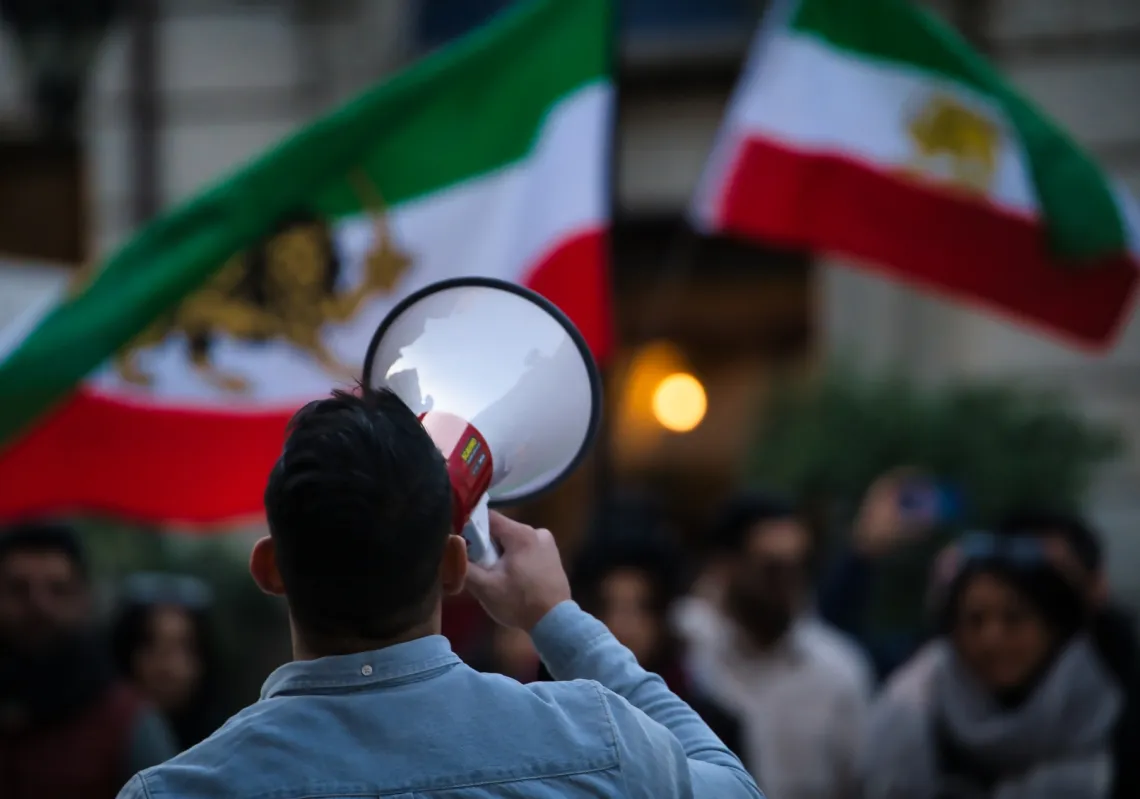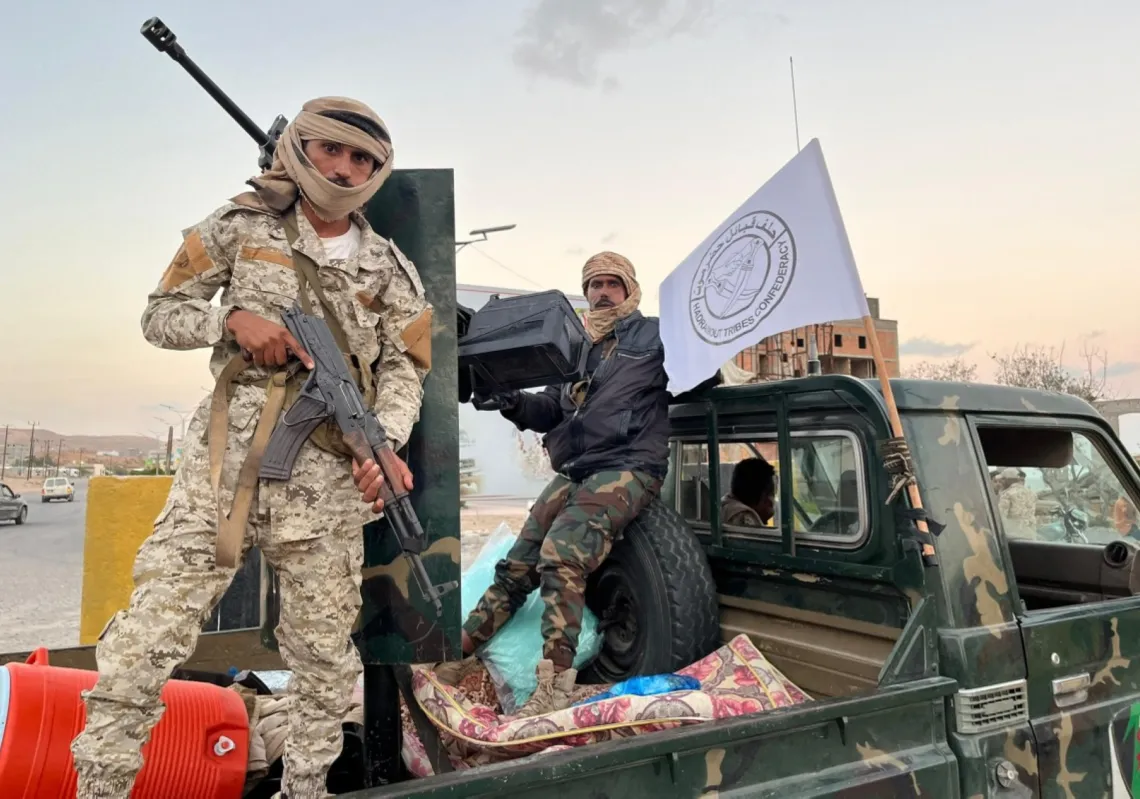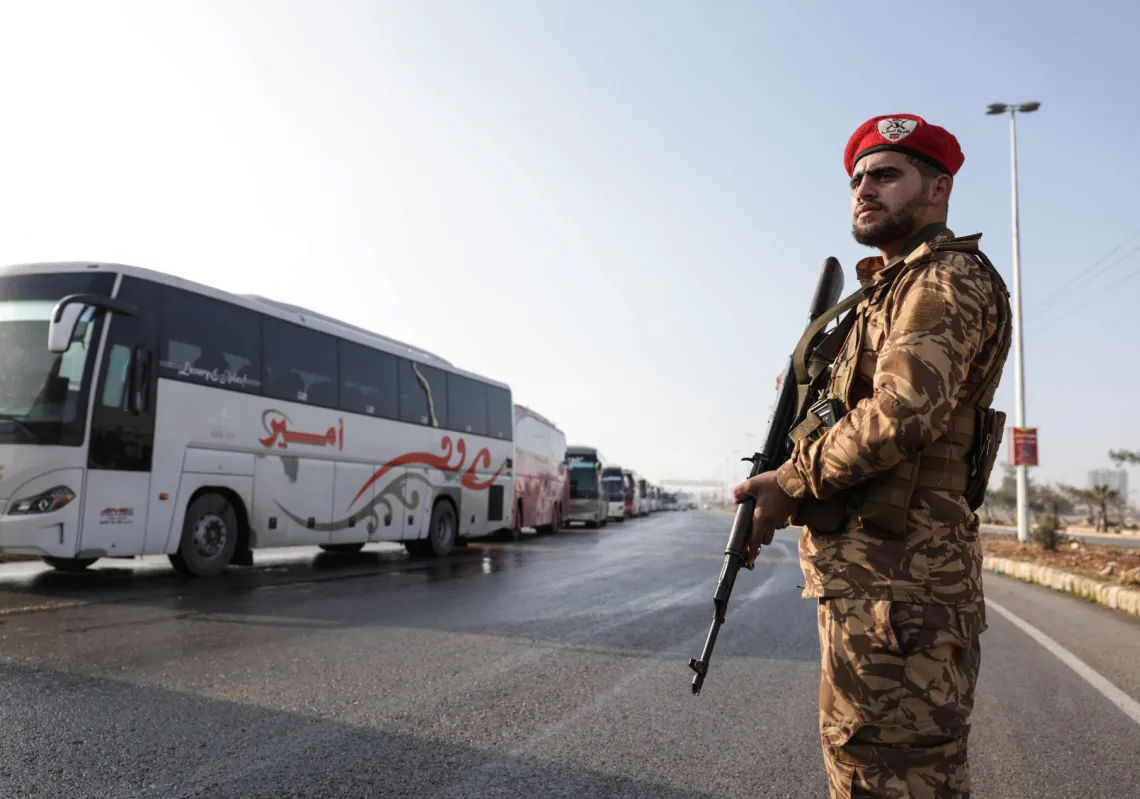 A young Syrian protester holds a sign calling for a no-fly zone during a demonstration in support of the Free Syrian Army near the Syrian–Turkish border crossing of Al-Salama on September 7, 2012. Source: ACHILLEAS ZAVALLIS/AFP/Getty Images[/caption]
A young Syrian protester holds a sign calling for a no-fly zone during a demonstration in support of the Free Syrian Army near the Syrian–Turkish border crossing of Al-Salama on September 7, 2012. Source: ACHILLEAS ZAVALLIS/AFP/Getty Images[/caption]
Should the United States become more actively involved in Syria? It is a question that deeply divides Washington. And it was the question recently debated at a new member of the Washington think tank fraternity. The January 30 event was sponsored by the McCain Institute for International Leadership, a new forum launched by Republican Senator John McCain.
The debate underscored two very different views on the ability of the US to influence events in the Middle East, as well as two very different reactions to the aftermath of the US occupation of Iraq. Those arguing for US intervention in Syria—mainly by setting up a no-fly-zone to protect Syrian refugees and rebels in parts of Syria and by arming certain rebel groups—showed a strange amnesia towards the lessons of Iraq: that even with thousands of troops on the ground, the United States cannot dictate the outcome of civil war or implant democracy in societies deeply riven by sectarian rivalries.
Those who said the US should not try to “tip the scales” in the battle between Bashar Al-Assad’s government and the rebels had a better memory. They cited Iraq as exhibit number one to support the case for non-intervention, adding that the United States would only get sucked into a very complicated ethnic and sectarian struggle, which is already spilling over into neighboring Lebanon.
So let us hear from the debaters first-hand: Robert Kagan, a historian and senior fellow at the Brookings Institution in Washington, said that for the United States, “Syria is unquestionably a place where humanitarian issues and [US] strategic interests do converge” and that Washington should therefore become more involved in shaping the outcome.
Kagan warned of Syria becoming “a failed state ... [with] vast swatches in chaos” that could provide a home for terrorists in the future. An example of what the United States could do, he said, was the creation of the no-fly-zone in northern Iraq in 1991 to protect Kurds from the forces of then-President Saddam Hussein. He also cited the dispatch of US troops to Panama and Somalia in the past, which he said had “saved lives” in those countries.
Journalist Leon Wieseltier of the New Republic also argued for more American intervention in Syria, again citing “moral” and “strategic” reasons. “Given both the magnitude of the humanitarian crisis there and the strategic importance of the country,” Wieseltier said, “there is no greater blow that could be dealt to Iran at this moment than the fall of the Assad regime.” His implication was that the United States should actively assist in bringing down the Assad government. He added that this would also be a blow to Hezbollah and Hamas.
“The pursuit of our moral values abroad turns out to have strategic benefits,” Wieseltier said. He urged Washington to “help those forces ... who are beginning a long struggle” to unseat President Bashar Al-Assad, and he lamented that “the jihadists” in the armed opposition “are gaining the upper hand.”
In an echo of what neo-conservatives argued when the United States found itself bogged down in Iraq, he added, “If we believe that the emergence of democracy around world is in our interest, we have to develop” strategies to promote that interest.
The opponents of intervention argued that the United States should not arm the rebels or interfere in ways to influence the outcome of the fighting, warning against any delusions that Washington might have over shaping Syria’s future. At the same time, they urged greater US assistance for humanitarian aid to Syrian refugees and displaced persons.
Aaron David Miller, a vice president at the Woodrow Wilson International Center for Scholars, cautioned against the “superpower sin of omnipotence,” which makes a nation believe it can accomplish anything abroad. A democratic state is an unlikely outcome of the civil war in Syria, Miller said, adding that what is occurring in Syria is a prime example of one of the major developments of the Arab uprisings, the “imploding” of the Arab state.
Moreover, Miller said, becoming more actively involved in shaping the outcome of the battle for Syria “would mandate a degree of responsibility that I don’t think we can afford right now [given] ... our broken house.”
Joining Miller to say “no” to increased US involvement was Joshua Landis, associate professor of International Studies at the University of Oklahoma and director of its Center of Middle Eastern Studies. “The question here tonight is, can America save Syria?” Landis began. “Only Syrians can save Syria,” he continued. “America cannot nation-build in the Middle East and should not get involved in the middle of a sectarian and ethnic war.”
Landis cited Iraq as a red flag for what could happen in Syria if its current ethnic framework is overturned. “Now the Sunnis are at the bottom of society and they are very unhappy.... The Sunnis have become radicalized and are blowing up car bombs every day in Iraq because it’s a zero-sum game for the losing ethnic groups.”
Nobody knows what Syria will look like in the future, Landis said, raising the possibility that it could self-partition into Kurdish, Alawite and Sunni mini-states. Or, he said, “The Alawis could run for their lives. All 2.5 million of them ... they could all go to Lebanon.” It would not bode well, he concluded, “if we put our hands too far on one side of the scale and then we leave, as we invariably do.” Rather, he concluded, it is the Syrians themselves who must work out “an equilibrium” between their country’s different confessional and ethnic groups.









